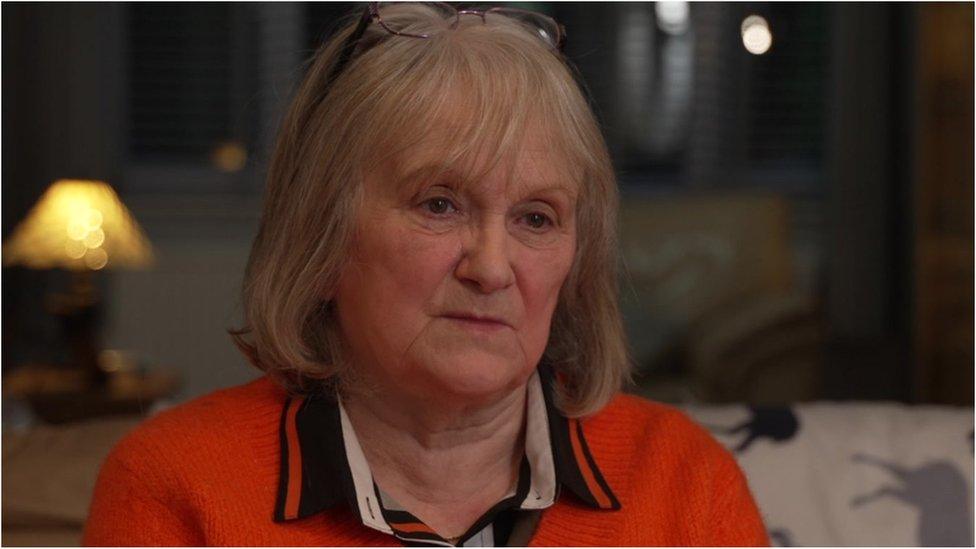Pension income needed to retire jumps as family costs rise
- Published
- comments

A single person will need £31,300 a year for a moderate income in retirement, according to a pensions industry body.
The rising cost of living and an expectation to offer financial support to grandchildren had pushed up the income required by £8,000, it said.
The Pensions and Lifetime Savings Association (PLSA) uses evidence from focus groups to make the estimates.
It is intended as a guide for those planning their retirement savings.
The rise is primarily the result of rising food and energy costs, researchers said.
The calculations are pitched at three different levels - minimum, moderate and comfortable - and are developed and maintained independently by the Centre for Research in Social Policy at Loughborough University.
They estimated that a single person needed £14,400 a year for a minimum income, and £43,100 a year for a comfortable retirement.
Couples required a joint £22,400 at the minimum level, £43,100 at a moderate level, and £59,000 at a comfortable level.
Pandemic priorities
Nigel Peaple, director policy and advocacy at the PLSA, said: "The cost of living has put enormous pressure on household finances over the last year and, as the research shows, this is no different for retirees."
Professor Matt Padley, from Loughborough University, said the research highlighted the increasing importance people placed on spending time with family and friends out of the home, as priorities had changed following the pandemic.
For example, in-depth discussion groups considered that at the moderate level of retirement, people should be able to have a monthly meal out with their loved ones and help their family members financially with a budget of £1,000, such as helping with grandchildren's activities.
Under the estimates:
A minimum standard includes around £95 for a couple's weekly groceries, a week's holiday in the UK, eating out about once a month and some affordable leisure activities about twice a week
A moderate standard ups the amount slightly and includes running a small second-hand car, a week holidaying in Europe and a long weekend break in the UK
A comfortable retirement includes luxuries such as regular beauty treatments, theatre trips and two weeks' holiday in Europe a year
None include housing costs, because many pensioners have paid off a mortgage, while those who rent often have a benefit entitlement to help them pay.
How much do you need to save?
The amount someone needs to save during their working life to reach these levels of retirement income is a complicated and highly speculative calculation.
That is because of changes over such a long time, the variety of pensions options, and lots of variables.
In very simple terms:
Someone with a defined benefit pension will be paid an income at retirement. Each year, as they save, they receive an update on how much pension they are forecast to receive
If a single person buys an annuity (a retirement income) when they stop work, they would need to have saved £40,000 to £70,000 to reach the minimum standard, according to the PLSA, or £300,000 to £500,000 for a moderate standard, or £490,000 to £790,000 for a comfortable standard.
Many people now drawdown a pension from their invested pot. Under this option, a single person needs savings of £70,000 for the minimum standard, £490,000 for a moderate standard, and £790,000 for a comfortable level, according to investment platform AJ Bell
All this incorporates people also receiving the full state pension. The calculations are based on today's prices and make a host of other assumptions. For example, annuity rates change, so experts stress this can only be an illustration.
'Wake-up call'
The triple-lock, which is used to uprate the state pension, acted as a crucial safeguard against rising retirement living costs, researchers said. It will rise by 8.5% in April to just over £11,500 a year.
In addition, workers are now automatically enrolled into a pension scheme, taking a chunk of income and putting it into a pension pot, unless employees opt-out. A government spokesman said this had "transformed pension saving" and would be expanded.
Pensions commentators described the estimates as a wake-up call. The amount needed for a moderate income, according to the estimates, is similar to the median average gross annual earnings of a full-time employees, which official statistics show is £34,963.

Carole Whyatt says equality is yet to be achieved
A separate report by provider Now Pensions and the Pensions Policy Institute has suggested that, typically, women face needing to work for an extra 19 years to retire with the same pension savings as men.
Carole Whyatt, a pensions campaigner, said: "I've heard a couple of people say, well, you wanted equality with the men, and you've got it."
She said inheritance money helped her get through.
"If it hadn't have been for the money that came to me when my mum died, which was shared out between the family, we wouldn't have survived. We wouldn't have managed. I genuinely don't know what we'd have done to get through," she said.
The report said women retired on average with pension savings of £69,000, compared with £205,000 for men. Options from these savings include keeping them invested and partially drawn as an income, or used to buy an annuity which provides an annual pension income.

Sign up for our morning newsletter and get BBC News in your inbox.

